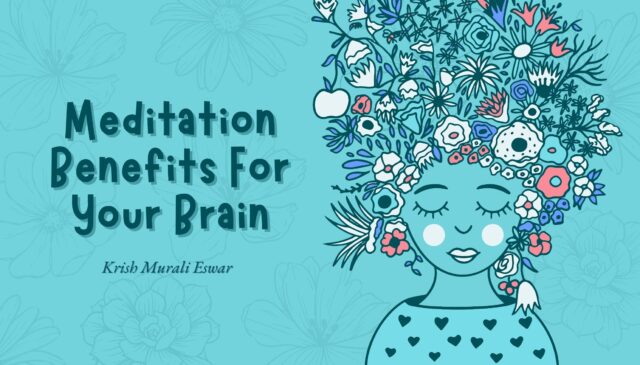
The mind is like an ocean, ever-changing and unpredictable. With meditation, you can access a deep inner stillness. You can unlock your full potential with the excellent benefits of meditation for your brain.
Meditation has been around for centuries, but researchers have only begun to uncover its powerful effects on the brain.
Research shows that meditating just five minutes daily has resulted in fundamental physical and mental health changes.
These findings are fascinating.
Let’s take a closer look at how meditation works magic on the brain.
What Is Meditation?
Meditation is like a bridge to the inner sanctum of your soul, connecting you with the higher self and allowing for greater clarity.
It’s a practice that helps us to release our anxieties, find balance within ourselves, and access powerful states of awareness.
Unlike any other activity, meditation has been scientifically proven to offer numerous benefits for our brain.
Meditation is training our minds to focus on one thing at a time while eliminating distractions from outside or within. It helps us to reach an inward state of peace and stillness. This can lead to increased levels of concentration and productivity, improved memory capacity, and more effective decision-making abilities.
Additionally, meditation releases endorphins which help reduce stress and anxiety and increase feelings of happiness.
Doing so allows us to gain insight into who we are beneath what society may be telling us about ourselves and how we should behave. Moreover, it enables us to identify patterns that no longer serve us positively.
Meditation provides tremendous value for our mental health by helping combat negative thought cycles, improving sleep quality, and providing more precise insights into life’s purpose – all while increasing intellectual performance! So, if you want to start experiencing these fantastic benefits today, why not try?

How Does Meditation Impact The Brain?
The practice of meditation is beneficial for both physical and mental health, including an array of cognitive benefits such as:
- improved concentration,
- memory recall,
- creativity,
- clarity of thought, and
- emotional regulation.
To understand why this occurs, we must look closely at what happens in our brains when meditating.
During meditation, the brain enters into a state known as alpha waves or deep relaxation. Hence, your attentional focus is heightened while stress hormones are reduced.
It leads to better overall mental performance due to increased blood flow to areas responsible for decision-making and problem-solving.
Additionally, studies show that regular meditation can lead to long-term structural changes in the brain, such as:
- increased grey matter density and
- thicker cortical layers in certain regions associated with emotion regulation.
In short, then, not only does mediation directly improve cognition through its immediate calming effect, but it also induces lasting changes in the structure of your brain over time, leading to enhanced mental capacity and well-being.

The Benefits Of Meditation On Stress
One of my kundalini meditation students, Anusha, was a middle-aged woman who struggled with severe stress for years. She had tried many different relaxation and meditation methods, but none seemed to work. She was desperate for something that would help her cope with the strain.
One day, Anusha came to me and asked if I could teach her kundalini meditation. I agreed, and we began her lessons immediately. A lady master in my center awakened her Kundalini to Ajna and Sahasrara.
I taught her introspection exercises.
At first, Anusha found the exercises challenging and felt very anxious, but I encouraged her to keep at it.
As the weeks went on, Anusha’s stress levels began to decrease. She reported feeling calmer, more focused, and more in control of her emotions.
She stayed in the present rather than ruminating over the past or worrying about the future.
After a few months of practice, Anusha reported feeling a tremendous sense of relief. She had finally found a way to manage her stress and take control of her life.
Anusha now practices kundalini meditation regularly and has seen a dramatic improvement in her well-being. She is much happier and healthier than she was before she started.
The benefits of meditation on stress are like a soothing balm for the soul. Its calming effects can be felt instantly when practiced with intention and dedication.
Meditation’s Effect on Brain Chemicals Causing Stress
Through research in Neuroscience, scientists have found that regular meditation increases the activity of the parasympathetic nervous system, which is responsible for the body’s relaxation response. This response slows the heart rate, lowers blood pressure, decreases cortisol levels, and reduces stress overall.
As people meditate, their brains can focus more, be more creative, and experience more clarity. Additionally, meditation has been found to increase the size of the hippocampus, the part of the brain that plays a significant role in memory, learning, and emotional regulation.
Research conducted by neuroscientists has found that regular meditation can significantly affect the amygdala and various stress chemicals.
The amygdala is a part of the brain responsible for processing emotions, and it is often overactive in individuals suffering from chronic stress.
Studies have found that regular meditation can reduce activity in the amygdala, decrease the body’s stress response, and help regulate the production of essential stress hormones, such as cortisol.
One study conducted at Harvard Medical School found that participants who engaged in an eight-week meditation program experienced a significant reduction in their amygdala activity and a decrease in cortisol levels compared to individuals in a control group.
The study also found that the meditating individuals reported feeling calmer and less stressed than the control group.
Other research has found that meditation can positively affect the production of other stress hormones, such as adrenaline and noradrenaline.
It’s as if you’ve stepped into a world of serenity, where all worries and anxieties evaporate.
Kundalini yoga is especially beneficial for relieving stress because it relies heavily on focusing on your life-force pulsations.
The result?
Our nervous system recharges itself, and our energy levels soar!
This gives us greater clarity about handling stressful situations and helps us stay connected to our inner voice of intuition. In addition, this gives us access to powerful insights from within ourselves.
So make sure you carve out some time each day for yourself and allow the healing power of meditation to work its magic on your mind.
You won’t regret it!
Benefits of Meditation for Improving Focus And Concentration
We can improve our focus and concentration with just 20 minutes of daily meditation!
As a Kundalini Master, I’ve seen firsthand how effective this technique can be. Meditating gives us access to the subconscious mind which helps us develop better clarity and control over our thoughts.
A college student had been struggling with his studies for some time.
After beginning a regular practice of Simplified Kundalini Yoga at our center, he began to see positive results. He was able to focus better, and as his practice deepened, his grades began to improve.
Soon, he was top of his class in one of his subjects. He attributed his success to the improved clarity of thought and focus he gained through practicing Kundalini Yoga.
He was amazed at how this ancient practice had such a profound effect on his academic pursuits.
After successfully passing all his exams, he continued to practice Kundalini Yoga and felt the ongoing benefits of improved concentration and clarity of thought.
Meditation’s Effect on the Brain’s Ability to Focus
- Meditation increases the production of neurotransmitters such as dopamine and serotonin, which regulate attention and emotional stability.
- It can strengthen the connections between brain cells, increasing the speed and accuracy of information processing.
- It has been shown to reduce activity in the amygdala, the part of the brain responsible for the experience of fear and anxiety.
- Regular meditation has been linked to decreased activity in the default mode network (DMN), which is associated with daydreaming and mind wandering.
- It can also reduce levels of the stress hormone cortisol, which can interfere with our ability to concentrate.
- Meditation increases gray matter in the prefrontal cortex, the part of the brain responsible for higher-order cognitive functions such as problem-solving and decision-making.
So if you want to get ahead at work or school, try incorporating meditation into your routine today. You may feel sharper than ever – ready to take on whatever challenges come your way!

The Impact Of Meditation On Memory
Janesh was a middle-aged man who came to me to improve his memory. He was a successful IT professional with a busy job and a family to care for. He had been struggling with a poor memory for years, and he was desperate to find a way to improve it.
Janesh had tried many methods, from using memory improvement apps to taking brain-boosting supplements, but nothing seemed to help. After doing some research, he decided to give Simplified Kundalini Yoga a try.
Kundalini yoga is a type of yoga that focuses on stimulating and awakening the energy centers of the body. It uses life force meditation to help access higher states of consciousness.
I started Janesh off with Ajna and Sahasrara Chakra’s Kundalini yoga meditation. I asked him to practice for a few minutes daily and focus on the vibration of his Kundalini Shakthi.
I also taught him Kayakalpa Yoga.
Within a few weeks, Janesh began to notice a difference. He could remember things better and found that his concentration and focus had improved. He was less easily distracted, and he was able to pay attention to tasks longer.
After a few months of regular practice, Janesh was amazed at the results. His memory had improved significantly, and he could remember details better and recall information more quickly. He was also able to think more clearly and process information faster.
Janesh’s story is a testament to the power of Kundalini yoga. The right approach and dedication can indeed be a life-changing experience.
Why Simplified Kundalini Yoga Practices Enhances Memory?
Brain neurons are specialized cells that send and receive electrical signals throughout the body. These neurons control all of the body’s functions, including memory.
The neurons are powered by biomagnetic energy. The brain uses up to 25% of the body’s biomagnetic energy to facilitate the functioning of these neurons.
Meditation and Kayakalpa Yoga help increase biomagnetic energy, which can help improve the functioning of the brain’s neurons.
Through meditation, individuals can become more aware of their thoughts and feelings, which can help to improve concentration and focus.
Kayakalpa Yoga involves breathing techniques that transmute sexual energy into the vital fluid in the brain.
This can lead to improved memory and cognition, as the neurons can send and receive signals more efficiently.
Additionally, the increased energy can help to relax the body, reducing stress and anxiety, which can further improve the functioning of the brain’s neurons.
As your brain begins its journey toward greater clarity and understanding, memories become easier to access and retain more information than ever.
With practice, you’ll find yourself able to remember things faster and with improved accuracy – no matter what life throws you!
This process requires patience but pays off when experienced through regular practice. Don’t expect miracles and instant results. As time passes, those who dedicate themselves to meditation will discover newfound strength in their recollection abilities.
It’s easy to see why so many have chosen to pursue a timeless tradition like meditation: its positive effects on memory are undeniable!
Enhancing Creativity Through Meditation
Once, a young musician was struggling with his music career. He was trying to make it big, but nothing seemed to click. He was getting frustrated and desperate.
One day he approached me and asked if I could help him awaken his dormant Kundalini energy. I agreed, and we began a series of spiritual practices to awaken his Kundalini energy.
After several months of hard work, his Kundalini energy was finally awakened, and he was ready to take on the world. He was now producing excellent quality music, and his compositions were getting noticed by Kannada and Malayalam movie producers.
He was now living his dream and could make a living out of his passion for music.
He credits his success to the Kundalini awakening, which I helped him to achieve. He believes he would not have been able to make it this far without my help. I’m glad that I was able to help him on his journey to success.
The power of meditation to unlock creativity is like a hidden pearl waiting to be discovered within us. With the proper guidance and practice, we can tap into the inner wisdom that guides us toward greater clarity and understanding.
Meditation’s Effect on Creativity
- Meditation increases activity in the default mode network (DMN), a brain network associated with creative thinking (Lazar et al., 2005).
- Meditation increases cognitive flexibility, allowing creative problem-solving (Jha et al., 2007).
- Meditation increases theta activity in the brain, which is associated with creative insight (Travis et al., 2010).
- Meditation increases alpha activity in the brain, which is associated with creative thinking (Travis et al., 2010).
- Meditation increases lateralized attention, allowing for a more holistic view of the world and greater creativity (Jha et al., 2007).
- Meditation increases focus and attention, allowing for greater creative output (Lutz et al., 2004).
- Meditation increases neural connectivity, allowing for greater integration of ideas and increased creativity (Lutz et al., 2004).
Kundalini meditation has been shown to open up new pathways in our creative thinking – allowing us to access untapped potentials and unique perspectives on life. In addition, regular practice will enable us to experience more flow in our everyday activities, such as writing, painting, or music-making.

Meditation also helps build resilience when tackling complex problems or taking risks with ideas – this increases our ability for innovation!
Let your journey unfold, and discover what lies beyond your imagination!
The Benefits Of Meditation In Emotional Regulation
Do you know the power of meditation? It is a tool that can help us regulate our emotions and bring balance to our lives. As a Kundalini master, I have seen many people benefit from this practice.
Here are four powerful ways in which meditation helps with emotional regulation:
- Meditation boosts self-awareness – By meditating regularly, we become more mindful of how we feel and respond to different situations. This increases our understanding of ourselves, allowing us to control our emotions better.
- Meditation calms the mind – Regular meditation makes your brain less reactive to stressors and triggers. This allows you to remain calm even in challenging or uncomfortable situations.
- Meditation reduces fear and anxiety – Regular meditation has been found to reduce fear and anxiety responses by decreasing activity in the amygdala (the part of the brain responsible for fear).
- Meditation supports emotional healing – Through its calming effects on both body and mind, meditation provides an environment conducive to emotional healing. With time and practice, it can help us navigate through difficult experiences with less reactivity and more clarity.
So if you’re looking for something that will support your journey toward being emotionally balanced, give meditation a try today – you won’t regret it!

Meditation Makes You Conscious of Thought Patterns
Meditating regularly helps us become aware of our thought patterns, enabling us to understand how we think and why we act the way we do.
This can be highly beneficial for:
- managing stress levels,
- uncovering deeply buried feelings and emotions,
- improving communication skills,
- dealing with physical pain or illness more effectively, and
- making better decisions.
Meditation Builds Positive Thinking
As your practice deepens, you will begin to notice changes within yourself:
- you’ll be able to identify thoughts that are not serving your highest good and release them from your mind;
- become grounded in who you indeed are without all the labels society places upon us;
- gain clarity about what it is you want out of life;
- learn how to love yourself unconditionally;
- cultivate inner peace and wisdom;
- explore creativity through music, art, or writing;
- develop meaningful relationships based on mutual respect and trust;
- find joy in every moment, no matter where you are in your journey.
Self-awareness comes when we take the time to get quiet enough to listen attentively to our higher selves – those voices inside yearning for expression that only meditation can provide access to. So go ahead…
Take this opportunity to explore your depths and discover new parts of yourself that were hidden away, waiting patiently for recognition from within!

Boosting Self-Esteem Through Meditation
Meditation is a powerful tool for boosting self-esteem and connecting to your inner power.
It helps you:
- discover the strength and beauty within,
- allowing you to free yourself from self-judgment and
- open up to greater confidence and joy.
We practice stillness to observe ourselves objectively, gaining insight into what makes us feel good about ourselves and where improvement might be needed.
This process helps us identify areas of fear or insecurity so we can confront them head-on with courage and understanding.
With regular practice, this awareness allows us to appreciate our strengths while working on any weaknesses — ultimately leading to an empowered sense of peace, security, and purpose within ourselves.
Meditation Techniques To Try
Simplified Kundalini Yoga is a great way to start your journey into meditation. This type of yoga does not involve physical postures with breathing exercises and chanting mantras to open up energy channels throughout the body.
A trained master will safely and quickly awaken your Kundalini.
You will feel the beautiful tingling sensation of your life force within a few minutes.
This form of yoga can increase awareness, improve concentration, and even heighten intuition when practiced regularly.
So why not give it a try? You need 15-20 minutes alone each day, and you’ll begin reaping the rewards before long!
Conclusion
Meditation is a powerful tool to help improve your mental, physical, and spiritual health. With the proper practice, it can be an enriching experience.
You can benefit from regular meditation, from improving focus and concentration to lowering stress and boosting self-esteem.
So why not give meditation a try?
You have nothing to lose and everything to gain!
I encourage everyone reading this article today to start their journey toward inner peace and greater well-being through the beautiful world of meditation.
Be Blessed by the Divine!
Krish Murali Eswar.
References:
Jha, A. P., Krompinger, J., & Baime, M. J. (2007). Mindfulness training modifies subsystems of attention. Cognitive, Affective, & Behavioral Neuroscience, 7(2), 109-119.
Lazar, S. W., Kerr, C. E., Wasserman, R. H., Gray, J. R., Greve, D. N., Treadway, M. T., … & Fischl, B. (2005). Meditation experience is associated with increased cortical thickness. Neuroreport, 16(17), 1893-1897.
Lutz, A., Greischar, L. L., Rawlings, N. B., Ricard, M., & Davidson, R. J. (2004). Long-term meditators self-induce high-amplitude gamma synchrony during mental practice. Proceedings of the National Academy of Sciences, 101(46), 16369-16373.
Travis, F., Tecce, J. J., Arenander, A., & Wallace, R. K. (2010). Patterns of EEG coherence, power, and contingent negative variation characterize the integration of transcendental and waking states. Biological psychology, 83(2), 182-199.
Leave a Reply